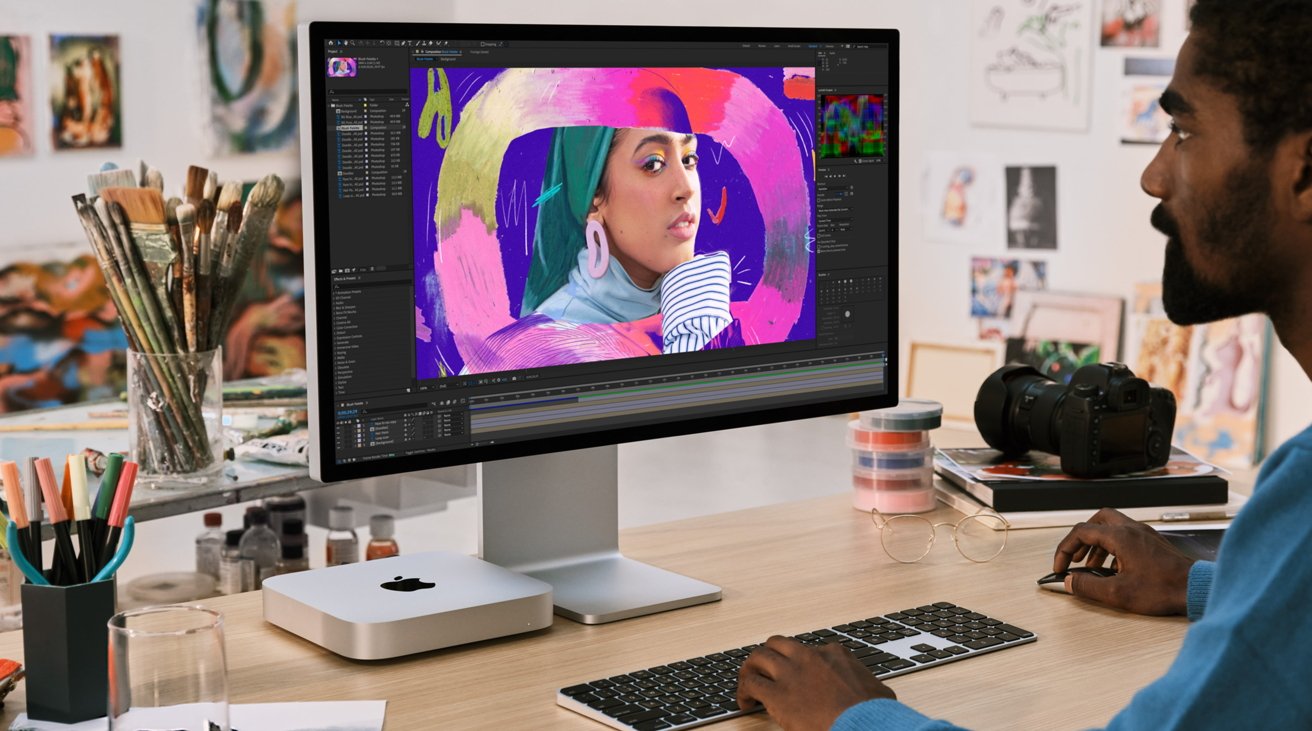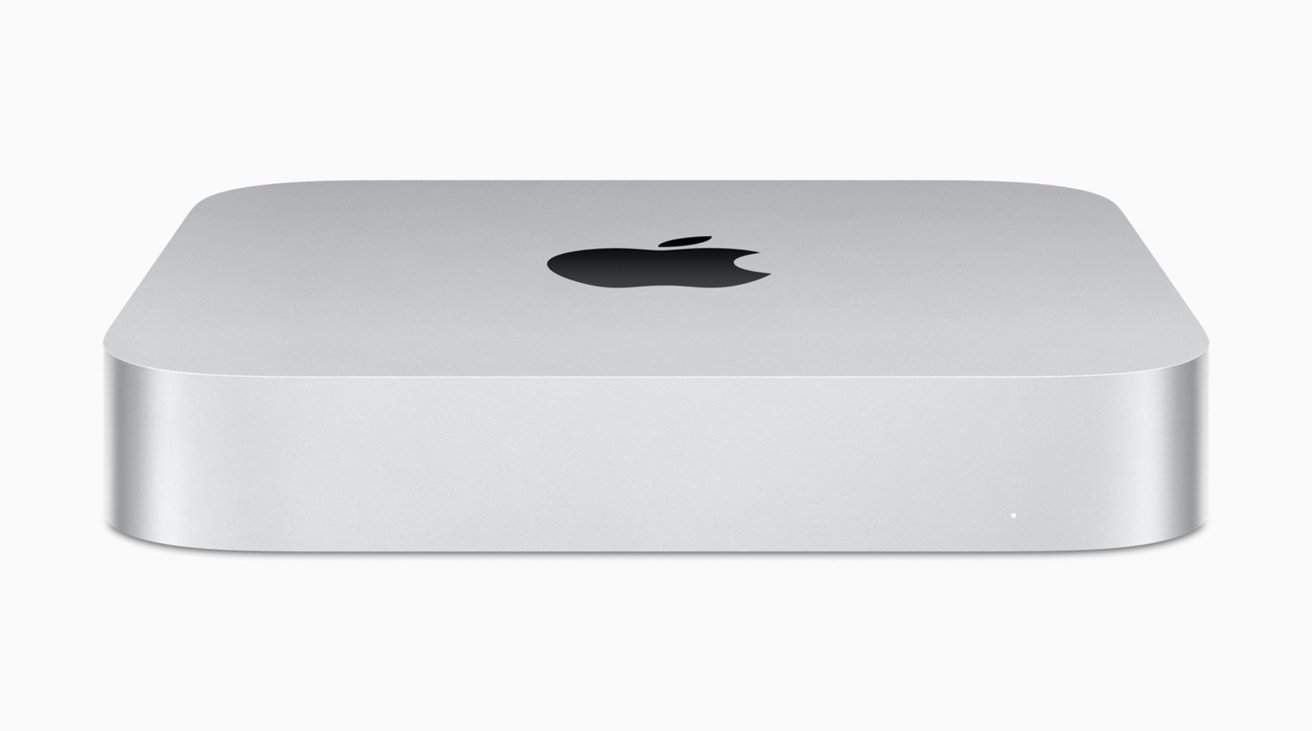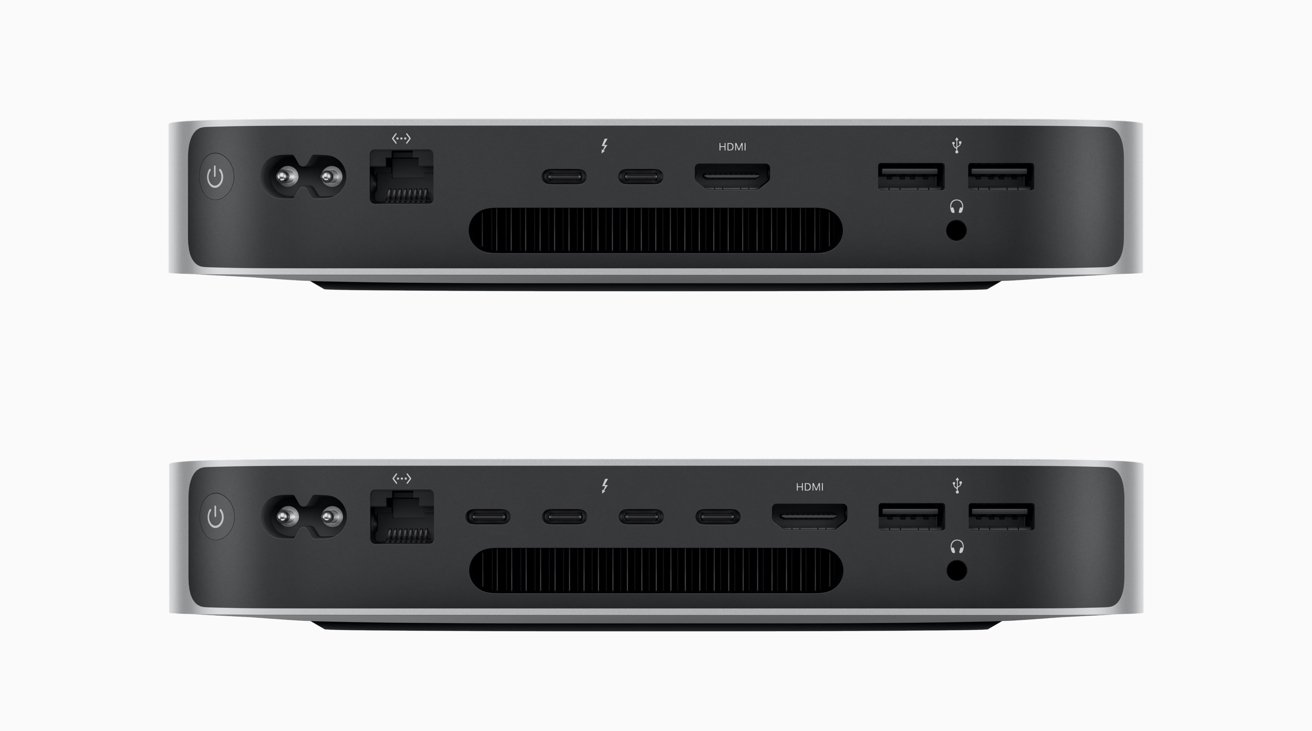Apple updates Mac mini with M2 and M2 Pro chip options
Apple has updated the Mac mini, with the second-generation Apple Silicon model now including M2 and M2 Pro chip options.

Announced as part of Apple's January launch event, the newest Apple Silicon Mac mini has undergone a spec bump, with an internal upgrade giving it more performance, and more chip options.
The main change is that Apple has upgraded the chip from an M1 to the choice of an M2 or M2 Pro, giving users the choice to go for a higher-performance version of the compact Mac.
That includes an M2 with an 8-core CPU and a 10-core GPU, the 16-core Neural Engine, and the Media Engine. Unified memory is offered in 8GB, 16GB, and 24GB varieties, with 100GB/s of memory bandwidth.

M2 Mac mini
The M2 Pro starts with a 10-core CPU with 6 performance and four efficiency cores as well as a 16-core GPU 16-core Neural Engine, and the Media Engine. An upgrade option is available, boosting the CPU to 12 cores and the GPU up to 19 cores.
On the memory side, with 200GB/s of memory bandwidth, the M2 Pro starts at 16GB of unified memory, with a configuration option of 32GB.
For storage, the M2 model has a 256GB SSD with 512GB, 1TBm, and 2TB options. The M2 Pro version starts at 512GB and has 1TB, 2TB, 4TB, and 8TB options.

The M2 Pro Mac mini has more Thunderbolt ports than the M2 version.
While there were rumors that Apple would bring out an overhauled design for the Mac mini, it seems at this time it's staying pretty identical to the M1 version. This includes the 7.75-inch rounded square aluminum enclosure, with all of the ports to the rear.
The M2 model's port selection is identical to the M1 version, including Gigabit Ethernet with 10Gig upgrades available, two Thunderbolt 4 ports, HDMI, two USB-A ports, and a headphone jack. The M2 Pro version adds another two Thunderbolt 4 ports to the mix.
Another internal change is wireless connectivity, with upgrades to Wi-Fi 6E and Bluetooth 5.3 included.
Apple says the new Mac mini models are available to order from Tuesday. Shipments will arrive as early as January 24.
The Mac mini with M2 starts at $599, while the M2 Pro version will start from $1,299.
Read on AppleInsider

Announced as part of Apple's January launch event, the newest Apple Silicon Mac mini has undergone a spec bump, with an internal upgrade giving it more performance, and more chip options.
The main change is that Apple has upgraded the chip from an M1 to the choice of an M2 or M2 Pro, giving users the choice to go for a higher-performance version of the compact Mac.
That includes an M2 with an 8-core CPU and a 10-core GPU, the 16-core Neural Engine, and the Media Engine. Unified memory is offered in 8GB, 16GB, and 24GB varieties, with 100GB/s of memory bandwidth.

M2 Mac mini
The M2 Pro starts with a 10-core CPU with 6 performance and four efficiency cores as well as a 16-core GPU 16-core Neural Engine, and the Media Engine. An upgrade option is available, boosting the CPU to 12 cores and the GPU up to 19 cores.
On the memory side, with 200GB/s of memory bandwidth, the M2 Pro starts at 16GB of unified memory, with a configuration option of 32GB.
For storage, the M2 model has a 256GB SSD with 512GB, 1TBm, and 2TB options. The M2 Pro version starts at 512GB and has 1TB, 2TB, 4TB, and 8TB options.

The M2 Pro Mac mini has more Thunderbolt ports than the M2 version.
While there were rumors that Apple would bring out an overhauled design for the Mac mini, it seems at this time it's staying pretty identical to the M1 version. This includes the 7.75-inch rounded square aluminum enclosure, with all of the ports to the rear.
The M2 model's port selection is identical to the M1 version, including Gigabit Ethernet with 10Gig upgrades available, two Thunderbolt 4 ports, HDMI, two USB-A ports, and a headphone jack. The M2 Pro version adds another two Thunderbolt 4 ports to the mix.
Another internal change is wireless connectivity, with upgrades to Wi-Fi 6E and Bluetooth 5.3 included.
Apple says the new Mac mini models are available to order from Tuesday. Shipments will arrive as early as January 24.
The Mac mini with M2 starts at $599, while the M2 Pro version will start from $1,299.
Read on AppleInsider


Comments
I'm super curious to learn what process is used to fab the M2 Pro. I'll be shocked if it's 3nm. Might be 4nm. Probably 5P (same as M2).
The M2 Pro configuration is more expensive than what I had hoped, but I knew my hopes were likely too optimistic. Still, though -- these look like the best Minis ever (not just in absolute terms -- also relative to what else is available on the market at the same time).
When the M2 Ultra chip is ready, then you'll see an updated Mac Studio model.
Yes, that is huge. When’s the last time we saw a spec bump and a price drop.
I think it’s still possible the Ultra could go to N4 (“third-generation 5nm”) or even beyond that (not N3, though, that’s a different design library). They’ve already changed the relationship between Pro and Max, so it’s not far-fetched to guess the M2 Ultra might not just be two Max joined together like it was in the M1 series. Indeed, the way he described it suggests it won’t be.
I had imagined buying multiple M2pro Minis to get lots of M2 processing power, but buying lots of M2s would be far more economical.
For example, for $3200 you can get 4 Minis that total 16 P cores, 16 E cores, 96GB RAM, and 1.5 TB of SSD.
That compares to $4000 for a Studio M1_Ultra with 16 P cores, 2 E cores, 64 GB RAM, and 1 TB of SSD.
Pretty awesome for folks doing work that's easy to distribute!
You get annual updates with Dell and HP workstations because they only have to make the PC.
They get the chips from Intel and AMD which are refreshed annually.
They get the OS from Microsoft (and for workstations the various entities that provide the Linux distros).
They only have to take those parts and use them to build "new" computers that rarely meaningfully change from year to year ... they just need to swap out last year's Intel/AMD CPU with this year's and keep everything else the same. I still remember the freakout that Intel caused when they stated that 12th gen and higher wasn't going to be backwards compatible with most older motherboards (even if you could get it to work it wouldn't be supported or covered by warranty).
That the PC manufacturers get everything else supplied to them that they only have to use to make - or more accurately have Foxconn and other white box types make for them - the PCs practically eliminates the R&D and manufacturing costs that Apple has to cover by themselves. That means that it makes no financial sense for Apple to refresh their Macs every year like they do their smartphones.
Another thing that makes refreshing smartphones each year sensible? That Apple sells hundreds of millions of them each year. Note that Apple TV, which sells in far lower volumes, gets refreshed much less frequently. Same deal with Macs. Apple sells 30 million Macs in a great year, 25 million in a good year, 20 million in a normal one. That means that the market for any annually refreshed device but the MacBook Air and MacBook Pro - their biggest sellers, and even that is only the entry level MBA and the 13" and 14" MBP - won't be big enough to sustain it profitably. This is not like PCs, which outsells Macs by a factor of 10, meaning that there will always be a decent number of people looking for a new HP or Acer in any given year.
The Mac Studio is a $2000 device that only makes sense for video and photo editors and musicians. For literally everyone else it is a terrible product because you can either get similar performance for way less than $2000 or a lot more performance for that $2000. Yes, that AMD Threadripper or Intel Core i9 workstation will be a lot bigger, noisier and draw a lot more power but it will do everything that doesn't need the prores codecs - again everything but photo, video and music stuff - faster and cheaper. To expect Apple to upgrade it any more often than every 2 years makes no sense. At least if it gets upgraded in 2023 then it will be a major upgrade from a 5nm M1 Ultra to a 3nm M3 Ultra. Merely going from a 5nm M1 to a 4nm M2 is lame. It only made sense to do it for the Mac Mini, MacBook Air and 13" MacBook Pro because they were still on the original 2020 M1, not the improved M1 that came out in 2021.
If I had to bet, though, I'd guess they will keep it on TSMC second-generation 5nm (5NP), like the M2 and M2 Pro/Max. I'll also guess that the relationship between the M2 Max and the M2 Ultra will be different from the relationship between the M1 Max and the M1 Ultra. The M2 Ultra won't just be two M2 Max together like it was for the M1 Ultra. It will be a true workstation design.
As for a near-term refresh of the Mac Studio, you're not accounting for the fact this is a transition period. You are right that Apple won't keep to an annual refresh cycle for any Mac, and two years or so is probably about right (the original rumor was 18 months), and really it's more just that they will refresh when they are ready to, and not on a set schedule. But that same logic also means Apple can, if they want, refresh the Mac Studio just a year after launching it, to close the book on M2 and complete the transition. They can do whatever they want.
There are three Macs still waiting for the M2, and all of them are Apple Silicon-era form factors: the iMac, the Mac Studio, and the Mac Pro. [FWIW, I consider the 2019 Mac Pro to be an Apple Silicon design, launched less than a year before the announcement -- the kludge was putting Xeon-W into it, not the other way around -- the Mac Pro has been sitting, waiting for Apple Silicon to grow into it.] I'll guess the iMac will arrive soon (along with iPad Air), probably March, but the Mac Pro and Mac Studio will wait until WWDC.
The only way that happens is if M2 Ultra/Extreme uses a different-generation TSMC 5nm process, which is possible but not something I would bet on, as I said above…
The hobbling of M2 Pro gives a hint at how complicated this can get, and what Apple will do to maintain clear lines in the product matrix. Want more than 32GB? You'll have to spring for a Max config, as Apple was clearly determined to keep a 48GB M2 Pro from muddying the waters. For instance, lot of musicians could have made good use of a 48GB M2 Pro mini (which would still have been a decrease from the 64GB available in the outgoing Intel model), as they have no need for all the extra GPU on the Max, but their only options remain the more expensive MacBook Pro and Studio configs.
I expect that only the MacBook Pro and MacBook Air will update with every processor generation, as they're by far the highest volume products in the line. All other models will update on a longer schedule, and likely in a fashion the keeps the product line as simple as possible and keeps different models from intruding too much into each others' territory. The longer product cycles won't be just because of marketing, though - Apple has demonstrated that their ability to multi-task is limited, especially when an entirely new product category (like the headset coming in 2023) is involved. The most important product lines - iPhone, MacBook, iPad (the latter two not necessarily in that order) - take precedence, and everything else gets whatever resources are left over.